Organising and participating in campaigns, social movements and networks that promote and protect women’s rights constitute a significant part of our work. We organise community-level campaigns and frequently participate in state- and national-level campaigns initiated by feminist and civil society networks. Through these activities, we provide a platform, both online and offline, to girls and women to amplify issues of gender inequality and advocate against them.
Community-Level Campaigns
We organise at least two community-level campaigns every year, choosing different topical themes under the banner ‘Todi Bandishen’ (Breaking Shackles). The campaigns usually coincide with ‘16 Days of Activism’ (November 25-December 10), which is an annual international campaign for the Elimination of Violence against Women, and International Women’s Day (March 8). The campaigns are designed to build public awareness and reach out to the community at large, but they are also advocacy events where we present our demands and views to relevant stakeholders.
Our young women leaders lead the planning and execution of these campaigns. They decide the theme, plan activities, prepare the campaign material and content, arrange the logistics and manage the events. Over the years, the campaigns have been run both offline (physically at the community level) and online (especially during the pandemic).

A Recent Example
‘Todi Bandishen: Kaam Ke Kshetra Mein Yuva Mahilayen’ (IWD, 2020)
The campaign ‘Women and the World of Work’ ran for seven consecutive days. It was organised in schools and at the community level, in our field area in Old Lucknow, with the purpose of promoting equal participation of women at workplaces and to break stereotypes about women’s work. Field mobilisers and women leaders conducted various activities on gender roles and stereotypes, and the importance of women claiming public spaces. The closing ceremony was held on International Women’s Day and included a panel discussion with working women from different field areas as well as a mela (fair) where stalls were set up and games on the theme played to build awareness.
Participation in Networks and Campaigns
Sadbhavana has participated in several district- , state- , national- and international-level feminist campaigns. We are part of networks that monitor, and seek to strengthen and reform, government policies and schemes to address issues such as poverty, malnutrition and hunger faced by vast swathes of our population – from a gender perspective. We are also part of networks that work on issues of violence against women. These platforms allow us to share information on laws and strategies to mitigate gender-based violence and provide support and express solidarity with our network partners. Our participation in such networks has strengthened our organisation’s internal capacities and those of our community leaders as well as brought grassroots women’s voices to these networks.

Some recent campaigns we have been involved in:
Meet to Sleep
We organised a local event to coincide with the ‘Meet to Sleep’ campaign, a national-level initiative aimed at enabling women to claim public places. The idea was that women go to a public space and occupy it by lying down or sleeping under the open skies. We went to a busy public park named Gulab Park in Lucknow. Many of the young women said they felt liberated by the act as well as comforted by doing so in a group.
I Never Ask For It Campaign
This international Twitter campaign was organised by Blank Noise to advocate against violence against women during the 16 Days of Activism campaign in 2020. Sadbhavana took part in it by sharing stories of marginalised young women’s experiences of systemic gender-based violence via podcasts and poster design.
Capacity-building
The Sadbhavana Trust invests in building capacities of their staff as it believes in providing opportunities to young women from the community to join the organisation and to take on different roles such as trainers. The training inputs recently provided include perspective-building on gender-based violence, legal literacy, constitutional rights, contemporary socio-political issues, issues of public health and mental health, writing workshops, training sessions on gender and sexuality, computer workshops, photography, videography and social media management skills. Staff members identify their learning needs, after which external resource persons are invited to hold sessions for them or are provided the opportunity of attending courses and workshops organised by other organisations.
We also provide training inputs to other organisations. For instance we have conducted a Training of Trainers programme with young youth leaders of partner organisations. Importantly, girls who went through our training programme are now trainers, both for our internal programmes and externally.


